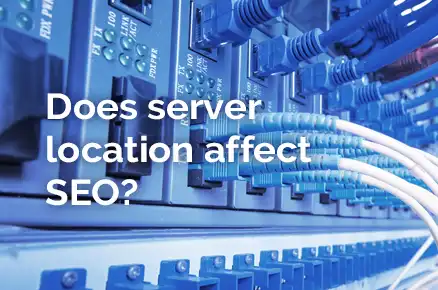Why use a dedicated server for your website?
Whether you're planning on building a website in the near future or you're looking at options for a fresh new rebrand, hosting should be high on your list of priorities.
With a vast choice of hosting platforms and services out there, finding the right one for you can be a challenge, especially when choosing between cloud and dedicated servers.
Why use a dedicated server?
Here at Clickingmad, we're firm advocates for quality hosting.
Read on to find out why:
What is a server, and what does it have to do with my website?
If you're using a Shropshire websiurte agency or website development company or hiring a West Midlands website design service, the topic of servers and hosting is likely to have come up at least once.
If you aren't clued into what these terms actually mean, here's a quick breakdown to get you started.
- A web server is basically a computer that is connected to the internet.
- It will be physically situated in a server farm, basically a building that has very quick internat access and loads of security.
- A web server is a way that companies can host websites for access to anyone that searches for your business.
- For many websites just starting out, that often means picking the cheapest option a host platform can provide.
- Which typically involves limiting your business by sharing hosting space in exchange for a smaller hosting fee every month or year.
- You need to be careful where you host your website as some shared services may have security issues or you may be sharing space with some unsavoury types of websites!
Should my website agency understand technical hosting?
The short answer is most definitely yes.
While the level of technical hosting expertise may vary among website agencies, many reputable agencies have a good understanding of technical hosting.
A professional website agency typically includes experts with knowledge of hosting infrastructure, server configurations, security measures, and performance optimisation.
They are equipped to handle technical aspects such as server setups, domain management, SSL integration, and website migrations.
However, it's essential for businesses to assess an agency's technical capabilities and experience before choosing one to ensure that they can effectively manage hosting requirements and provide reliable website performance.
Virtual servers versus Dedicated servers
While choosing a shared and probably cheap hosting service may work for a few months, you'll soon find your business outgrowing that basic package, and from there, you have two options:
Virtual Private Servers (VPS)
Virtual private servers are often referred to as 'cloud hosting', and they provide a boost in productivity above the basic package hosting many services offer.
While VPS servers definitely have their place as a middle-of-the-road option that's suitable for some businesses, they aren't the only choice available.
VPS servers are convenient - and offer an upgrade in performance without sharing - but if you're after as much power and flexibility as possible, they don't quite reach the top of the charts.
Dedicated Servers
Dedicated servers are our top recommendation for all website design, and for a good reason.
These physical servers may feel old-school in a world where everything is hosted on the cloud, but you're afforded plenty of benefits that quickly debunk that myth.
If you're serious about giving your business flexibility and reliable power, picking a dedicated server is an excellent decision for the price point.
If you're looking for the best of the best, a dedicated server ticks all the boxes when managed correctly.
What are the benefits of using a dedicated server?
Now you've got an idea of what a dedicated server is and what the other options on the market are, let's take a closer look at why you should use a dedicated server to host your website.
Sole ownership
One of the reasons many businesses like dedicated servers is that you own what you have.
That means you aren't sharing anything with anyone else, and you don't have the potential fear of downtime or extended maintenance that can come with shared hosting when you need it the most.
While this does mean you're responsible for your hosting to a greater degree, it also provides all-important ownership that many companies consider essential when choosing hosting.
Improved performance
A dedicated server for your website design launch means you get the additional performance needed for the most complex of website applications, and extra features.
If you're going beyond the basics in your website development, having access to ample power to make everything run smoothly can make a considerable amount of difference to how your website feels overall.
Flexibility
An average dedicated server is anything but a single-use service. With your own server for your business use, many different applications and functionality can be handled.
While website hosting is the biggest point of interest, the ability to host virtualisation, email servers and VPNs of your own through your dedicated server is an additional benefit.
Not to mention that flexibility extends to hardware, too – allowing for growth and upgrades as and when needed.
Long-term cost-effectiveness
While it's true that you'll pay more up-front for a dedicated server, in the long run, that ownership can be far more cost-effective than a typical shared hosting setup.
If you're renting your dedicated server from a provider, they will still be required to carry out necessary maintenance and repairs.
Still, you'll get the added benefit of high power and far more functionality from the start without paying for add-ons, modules or costly additional bits and pieces.
Enhanced security
Shared servers are more secure than ever before, but that cybersecurity standard still can't match up to the peace of mind a dedicated server can provide.
Your server is never shared, and there is no way to access your website outside of your own personal logins.
That puts you at far less risk of hacking, data loss, and all the other worries that come with shared hosting.
When do I need a dedicated server?
You may be wondering whether it's necessary to push the boat out on dedicated hosting when cheaper options are on the table.
But two of the first things you should consider when it comes to your website are longevity and growth.
Your business isn't static, and as it grows, you'll want to be able to meet demand and allow effective access to everyone that wants to find you.
While a cheaper hosting plan may look affordable up-front, you'll then need to pay for more power, greater storage and more functionality as your business grows and evolves.
With that can come extra downtime, costly migrations, and expensive up-front fees.
If budget is less of a concern, going for a dedicated server from the start is always a smart move.
Dedicated Server FAQ's
What is a dedicated server, and how does it differ from shared hosting?
A dedicated server is a hosting solution where an entire server is exclusively allocated to one client.
In contrast, shared hosting involves multiple websites sharing resources on the same server.
With dedicated servers, you benefit from full access to all server resources, delivering enhanced performance, security, and customisation options compared to shared hosting.
What are the benefits of choosing a dedicated server over cheaper shared hosting plans?
Opting for a dedicated server brings numerous advantages.
Firstly, you experience unparalleled performance as you have the server's entire resources at your disposal.
This leads to faster loading times, smoother website operation, and better user experiences.
Additionally, dedicated servers provide top-notch security, safeguarding your sensitive data from potential security breaches commonly associated with shared hosting environments.
The customisability of dedicated servers allows you to tailor the server setup precisely to your business requirements, providing ultimate flexibility and scalability.
How do dedicated servers impact website performance and user experience?
Dedicated servers significantly enhance website performance by eliminating the risk of resource contention observed in shared hosting.
With dedicated resources, your website experiences faster page loading times, reduced downtime, and efficient handling of peak traffic periods.
This translates to an exceptional user experience, fostering customer satisfaction and increasing engagement, ultimately leading to higher conversions and business success.
Are dedicated servers more reliable than cheaper hosting options?
Absolutely. The exclusive use of server resources in dedicated hosting ensures greater reliability.
In shared hosting, if one website experiences a surge in traffic or encounters technical issues, it can impact all other sites on the same server.
However, with dedicated servers, you are insulated from the performance fluctuations and potential risks caused by neighboring websites, ensuring consistent and stable performance for your website.
How does the level of control in dedicated servers compare to cheaper alternatives?
Dedicated servers grant you complete control over server configurations, operating system choice, software installations, and security settings.
This level of control is unparalleled in shared hosting environments, where the hosting provider dictates the server settings.
The freedom to optimise your dedicated server precisely to your requirements empowers you to run resource-intensive applications, implement advanced security measures, and customise the server environment to achieve peak performance.
What does scalability of dedicated servers mean?
Dedicated servers offer unmatched scalability, accommodating the growth of your business without any constraints.
As your website's traffic and resource needs increase, you can easily upgrade hardware, memory, and storage, or even add additional servers to create a load-balanced infrastructure.
This scalability ensures that your website can seamlessly handle increased demands, providing a smooth user experience during periods of high traffic and facilitating your business expansion.






News and Insights
Sign up for updates